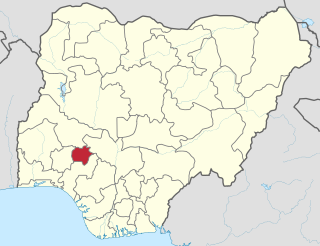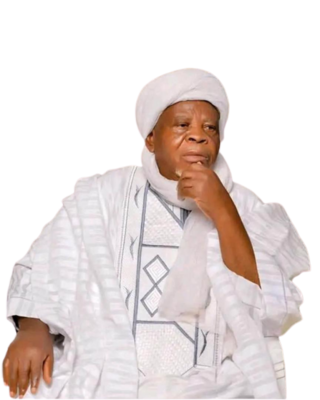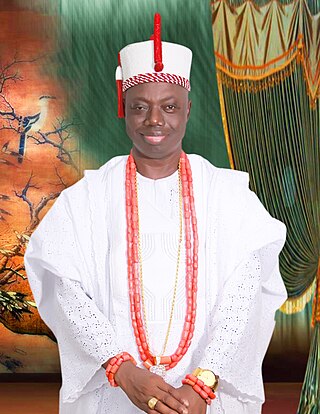Related Research Articles

Kano is a city in northern Nigeria and the capital of Kano State. It is the second largest city in Nigeria after Lagos, with over ten million citizens living within 449 km2 (173 sq mi). Located in the Savanna, south of the Sahel, Kano is a major route of the trans-Saharan trade, having been a trade and human settlement for millennia. It is the traditional state of the Dabo dynasty who have ruled as emirs over the city-state since the 19th century. Kano Emirate Council is the current traditional institution inside the city boundaries of Kano, and under the authority of the Government of Kano State.

Ekiti State is a state in southwestern Nigeria, bordered to the north by Kwara State for 61 km, to the northeast by Kogi State for 92 km, to the south and southeast by Ondo State, and to the west by Osun State for 84 km. Named for the Ekiti people—the Yoruba subgroup that make up the majority of the state's population—Ekiti State was formed from a part of Ondo State in 1996 and has its capital as the city of Ado-Ekiti.

The Johor Sultanate was founded by Malaccan Sultan Mahmud Shah's son, Sultan Alauddin Riayat Shah II in 1528. Prior to being a sultanate of its own right, Johor had been part of the Malaccan Sultanate before the Portuguese conquered its capital in 1511. At its height, the sultanate controlled areas in what is now modern-day Johor, Pahang, Terengganu, territories stretching from the rivers of Klang to the Linggi and Tanjung Tuan, respectively situated in the states of Selangor, Negeri Sembilan and Malacca, Singapore, Pulau Tinggi and other islands off the east coast of the Malay peninsula, the Karimun islands, the islands of Bintan, Bulang, Lingga and Bunguran, and Bengkalis, Kampar and Siak in Sumatra. During the colonial era, the mainland part was administered by the British, and the insular part by the Dutch, thus breaking up the sultanate into Johor and Riau. In 1946, the British section became part of the Malayan Union. Two years later, it joined the Federation of Malaya and subsequently, the Federation of Malaysia in 1963. In 1949, the Dutch section became part of Indonesia.

Kwara State is a state in Western Nigeria, bordered to the east by Kogi State, to the north by Niger State, and to the south by Ekiti, Osun, and Oyo states, while its western border makes up part of the international border with Benin Republic. Its capital is the city of Ilorin and the state has 16 local government areas.

Ado Bayero CFR, LLD, JP was the Emir of Kano from 1963 to 2014.

Okene is a town in the Nigerian state of Kogi. The town is based in a Local Government Area of the same name. Okene runs along the A2 highway. It had an area of 328 km² and a population of 320,260 at the 2006 census.
The Ebira people are an ethnic-linguistic group of North central Nigeria. Most Ebira people are from Kogi State, Nasarawa State. Their language is usually classified as a Nupoid variety within the Benue-Congo branch of the Niger-Congo language family. Until the separation of Kogi State from Kwara State, Okene was seen as the administrative center of the Ebira-speaking people in Kogi state, located not far from the Niger-Benue confluence. Since the formation of the state, the Ebira Ta'o people are predominantly found in five local governments in Kogi state, namely Adavi, Ajaokuta, Okehi, Okene and ogorimagongo. They are also found in large numbers located in the Federal Capital Territory, Abuja and Nasarawa in Toto LGA. Also, the Eganyi are found in Ajaokuta LGA. And the Etuno can be found in Igarra town of Agorimagongo, Okehi and Okene each with their administrative headquarters. Ebira Koto is found in Kogi and Koton Karfe LGA, Bassa LGA, Lokoja in Kogi and Abaji LGA in the Federal Capital Territory, Akoko-Edo LGA, Edo state.
Abdul Rahman bin Abdulaziz Al Saud was a senior member of the House of Saud and Saudi Arabian deputy minister of defense and aviation. At the time of his death, he was the oldest living member of the Sudairi Seven.
The 1966 Nigerian counter-coup was the second of many military coups in Nigeria. It was masterminded by Lt. Colonel Murtala Muhammed and many northern military officers. The coup began as a mutiny at roughly midnight on 28 July 1966 and was a reaction to the killings of Northern politicians and officers by some soldiers on 15 January 1966. The July mutiny/counter coup resulted in the murder of Nigeria's first military Head of State General Johnson Aguiyi-Ironsi and Lt Colonel Adekunle Fajuyi in Ibadan by disgruntled northern non-commissioned officers (NCOs). Upon the termination of Ironsi's government, Lt. Colonel Yakubu Gowon was appointed Head of State by the coup conspirators.

Sultan of Pahang is the title of the hereditary constitutional head of Pahang, Malaysia. The current sultan is Al-Sultan Abdullah ibni Sultan Ahmad Shah. He is the Head of Islam in the state and the source of all titles, honours and dignities in the state. Historically, the title was also used by rulers of the Old Pahang Sultanate.
Alhaji Adamu Atta was the first civilian governor of the Nigerian Kwara State during the Second Republic, representing the National Party of Nigeria (NPN).

Ibrahim Sulu-Gambari ascended the throne as the 11th Emir of Ilorin and Chairman Kwara State Traditional Rulers Council since 1995 following the demise of his uncle, Mallam Aliyu AbdulKadir.He voluntarily relinquished his position as the Presiding Justice of Court of Appeal, Lagos Division without any blemish to become the Custodian of the highly revered Shehu Alimi dynasty. He is one of the 10 prominent traditional rulers in northern Nigeria.
Mufutau Oloyede Abdul-Rahmon is a Nigerian professor of Arabic and Islamic studies. He is from Ile-Ogbo, Aiyedire Local Government Area of Osun State, Nigeria.
Alhaji (Dr) Umaru Sanda Ndayako, was the 12th Etsu Nupe from one of the ruling houses of Bida. His parents were Muhammadu Ndayako (CBE), the late 9th Etsu Nupe and Aisha Nuadoro.

Agbotomokekere is a Nigerian religious leader. He is the Chief Imam of Ibadanland. He became Imam Abdul-Ganiyy AbuBakr Agbotomokekere Oke-Koto in 2015.
The World War Cenotaph in Lokoja, Nigeria is a remembrance arcade for fallen heroes. It is located along Murtala Mohammed way, besides federal medical centre in Lokoja, the colonial Nigeria administrative center and headquarters of the Royal Niger Company.

Oba Abdul-Lateef Adeniran Akanni, Obaarun-Oladekan I was a Nigerian monarch. He was the Oba of Ado & Olofin Adimula Oodua of Ado-Odo and the traditional ruler of the Yoruba kingdom of Ado-Odo. He was installed as Oba of Ado & Olofin Adimula Oodua of Ado-Odo on 2 May 2009 holding the reignal name Ojikutujoye Obaarun Oladekan I, succeeding the deceased Oba J. O. Akapo, who died on 7 February 1989.
The Olofin Adimula Oodua of Ado-Odo is the Traditional Ruler and Yoruba king of Ado-Odo; he is also referred to as the Oba of Ado. Ado-Odo is the metropolitan headquarters of the Ado Kingdom in Ogun State, Southwestern Nigeria.

The 2023 Nigerian Senate elections in Kogi State were held on 25 February 2023, to elect the 3 federal Senators from Kogi State, one from each of the state's three senatorial districts. The elections coincided with the 2023 presidential election, as well as other elections to the Senate and elections to the House of Representatives; with state elections being held two weeks later. Primaries were held between 4 April and 9 June 2022.
Abdulrahman Ado Ibrahim was the fourth traditional ruler and Ohinoyi of Ebiraland, a traditional state with headquarters in Okene, Kogi State, Middle Belt, Nigeria. He was a son of the second attah of Ebiraland, Ibrahim Onoruoiza, of the Omadivi clan, who reigned from 1917 to 1954.
References
- ↑ Sarki, Idris Enesi (1996). The Ohinoyi throne: towards peaceful successions. Samaru, Zaria: S. Asekome. p. 15.
- ↑ Osaghae, Eghosa E.; Ibeanu, Okechukwu; Onu, Godwin; Gaskia, Jaye; Jibo, Mvendaga; Galadima, H. S.; Isumonah, Victor; Simbine, A. T. (2001). Ethnic groups and conflicts in Nigeria. Vol. 4. Ibadan: University of Ibadan. p. 113.
- ↑ Ajanah, Nuhuman (1997). Ebiras at a Glance. Vol. 2. Nigeria: Numa. p. 37.